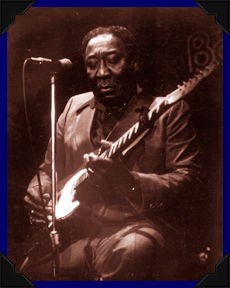
Born April 4, 1915, in Rolling Fork, Mississippi, to a sharecropping family, Morganfield moved to the Stovall Plantation near Clarksdale to live with his grandmother after the death of his mother in 1918. As a toddler he acquired the nickname Muddy from his grandmother because he loved to play in the muddy water of nearby Deer Creek. At age seven, Morganfield began playing the harmonica and became proficient enough to play fish fries, picnics, and parties by age thirteen. His family attached "Waters" to his nickname when he began playing harmonica, and the name stuck. Waters first heard records by Blind Lemon Jefferson, Memphis Minnie, Lonnie Johnson, Tampa Red, and the Memphis Sheiks on a neighbor's Victrola. He bought his first guitar at age seventeen with his sharecropper's wages and taught himself to play.
Waters's early influences were local guitarists Charley Patton and Son House. One of the first blues tunes he learned was House's "Walkin' Blues." At age eighteen, Waters opened a juke joint where patrons could drink, gamble, eat fried fish, and listen to the jukebox. He played parties, juke joints, and suppers in the Clarksdale vicinity with guitarist Scott Bohannah or his own string band. Waters fell under the sway of Delta guitarist Robert Johnson, whom he saw on the front porch of Hirsberg's Drugstore in Friars Point and whose records he played on his jukebox. Helena-based bluesman Robert Nighthawk offered to bring Waters to Chicago with him on a recording trip during the late 1930s, but he refused the invitation, preferring to remain with his infirm grandmother. In 1940, Waters did venture to St. Louis, then a hotbed of blues, but disliked it and returned to Stovall Plantation.
On August 28, 1941, folklorists Alan Lomax and John Work recorded Waters and fiddler Henry "Son" Sims at Waters's juke joint. Impressed with Waters's ability, they returned in July of the following year for additional material. The sound of his voice emanating from the recording machine's playback convinced Waters he had commercial ability. He caught a train to Chicago in May 1943, found a job, and was soon playing rent parties in the city. A recording session for Columbia Records in 1946 went unreleased. Another for the 20th Century label resulted in the release of "Mean Red Spider," a B-side to James "Sweet Lucy" Carter's 1947 single. Waters next recorded for the fledgling Aristocrat label, owned by Leonard and Phil Chess, in 1947. His second Aristocrat release, "I Can't be Satisfied" backed with "Feel Like Going Home," quickly sold out several pressings, thereby making Waters a bona fide star and solidifying the foundation of the Chess record label.
"I Can't be Satisfied" incorporates all the elements that would make Muddy Waters famous. His strong, rich tenor, sung slightly behind the beat, had a drawl that appealed to southern-born black record buyers. Waters's dark, bass-laden slide guitar conjured shades of blue that stood in stark contrast to the jazzy, single-string guitarists such as T. Bone Walker who were then in vogue. He also became a noted bandleader whose groups became a spawning ground for later blues stars "Little" Walter Jacobs, Jimmy Rogers, Otis Spann, James Cotton, and Junior Wells.
Waters returned to the Delta in 1949 with a trio composed of Jacobs, Rogers, and himself. They based their activities in Helena, Arkansas, where they appeared daily on radio station KFFA, then broadcasting from the Floyd Truck Lines Building. KFFA was famous throughout the Delta as the home of King Biscuit Time, a noontime radio show that featured Sonny Boy Williamson and his guitarist/sidemen Robert Jr. Lockwood, Elmore James, and Joe Willie Wilkins. Waters's trio performed on the 6 a.m. slot and used the exposure to advertise their upcoming gigs at the Owl Café and across the Delta. In 1950, he returned to Chicago and resumed his recording career. He continued to record for Chess during the 1950s, churning out down-home hits like "Long Distance Call," "Louisiana Blues," and the Memphis Minniederivative, "Honey Bee." Waters continued to tour the Deep South during the 1950s and 1960s, often with John Lee Hooker, but his home was now Chicago. In 1958, he toured England, opening the door for bluesmen to tour Europe. In 1960, Waters's band played the Newport Jazz Festival and won a large white following.
Muddy Waters died April 30, 1983, and is buried in Chicago.
Last updated: October 27, 2017
